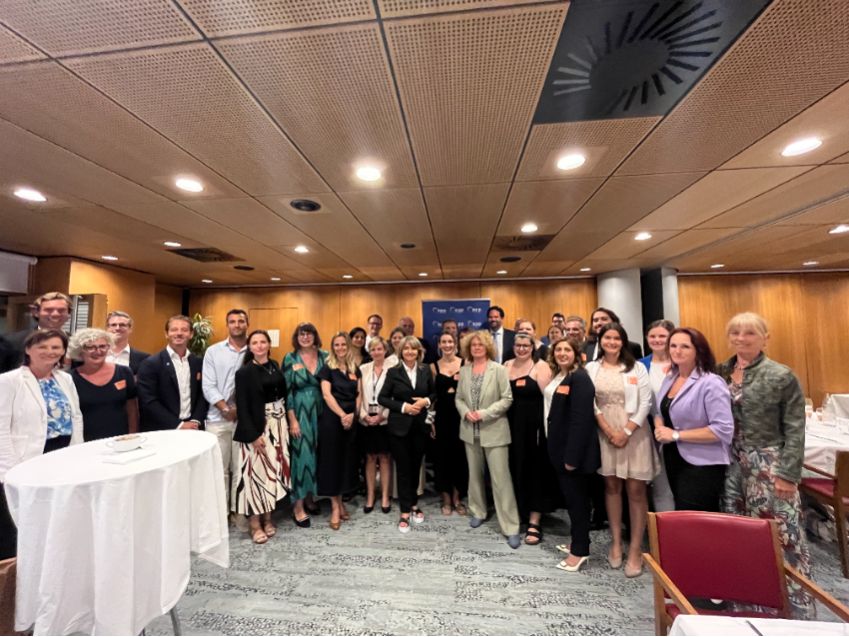[ad_1]
With 2023 designated as the European Year of Skills by the European Commission, it is time for a rethink on how to approach lifelong learning and work in Europe. The changes that are taking place now, particularly in the area of artificial intelligence and automation, are likely to drastically alter the way many people work. This change will be similar to the way the industrial revolution brought people from rural areas and farming into cities and factories; and transformed the skills that they needed to have. Therefore, it is important to recognise and cultivate the chance that entrepreneurship offers as the backbone of Europe, often taking the lead in pioneering innovation and modernisation efforts.
These were some of the topics discussed in the European Parliament in Strasbourg at the SME Connect Summit on Entrepreneurship, One-Person Companies, Self-Employment and the Future of Work, organised in partnership with Herbalife, and chaired by MEP Angelika Winzig and MEP Maria Grapini, with various participants from SMEs.
The skills of the future
The current business environment is undergoing drastic changes from all sides. Artificial intelligence, robotics and automation mean that some jobs may disappear, whilst for others there will be new opportunities and more needs. With repetitive tasks being undertaken by computers, person-to-person skills, creativity and improvised thinking might become the most valued skillsets. These are abilities that any entrepreneur would recognise quickly as essential in the business world, especially for SMEs. With SMEs representing 99% of all companies in the EU and employing around 100 million Europeans, their potential as an incubator for reskilling, upskilling and mentorship is formidable, especially considering how business nurtures skills that are highly transferable.
In order to adequately prepare and remain competitive in the world market, the EU and industry must cultivate a culture of anticipating skills needs and a different approach to work. During the event, MEP Lukas Mandl highlighted the role that businesses often play, which is that of a learning institution, or a school. Businesses have become a place where innovation, mentorship, and coaching take place on a daily basis. Mentorship in business is particularly noteworthy.

Benoit Haecker, Director of Herbalife France and Belgium, highlighted the support that Herbalife’s direct selling business model offers to entrepreneurs, with senior distributors sharing their experiences, victories and struggles, providing guidance, as well as instilling lifelong valuable skills. He further expanded on the benefits of SMEs, by underscoring how they can often permit themselves to be more flexible and innovative than large corporations or the public sector.
The next generation
Aspirations of the younger generations are also crucial when discussing skills. 65% of Gen Z expect to run their own business within 10 years. One way of addressing this desire is through direct selling. This meets the demand for independent work and provides skills which enhance future employability. Skills developed through direct selling include sales, management, communication and interpersonal skills, leadership, self-esteem and confidence amongst many others.
These are universal skills that can easily be transferred into the traditional corporate world and other business environments. Consequently, if a young person decides that entrepreneurship is not for them, they can transfer their skillsets to other forms of work. This is unlike most gig economy jobs, which often do not develop a culture of lifelong learning and rarely permit people to climb a business ladder, whether working for yourself, or as an employee.
Institutional support
“Business schools don’t look enough at entrepreneurship; universities need to do more, and learning does not end with school” explained Benoit Haecker, with the importance of an effective education system being frequently underlined during the event. Herbalife Independent Distributor Mathieu Poulat offered his take that “1 hour in the field is worth 10 hours in books”.
Business schools don’t look enough at entrepreneurship; universities need to do more, and learning does not end with school”
Benoit Haecker, Director of Herbalife France and Belgium.
More needs to be done to cultivate skills at a grassroots level to ensure a thriving European entrepreneurship sector. Leena Whittaker of EuroCommerce pointed out that “90% of growth in retail by 2030 will be driven by digitalisation”. This, along with the rise of the freelance economy, shows that the entrepreneur of the future will need to rely on the internet and technology even more than now.
Some promising programmes have started to encourage skill growth in Europe. On an EU-level, ERASMUS for young entrepreneurs is partially funded by the European Commission and facilitates mentorship exchanges between SMEs. Likewise, the Pact for Skills, launched by the EU in 2020, aims to partner up with industry to promote and advocate for upskilling and reskilling initiatives.
“1 hour in the field is worth 10 hours in books”
Mathieu Poulat, Herbalife Independent Distributor
Elsewhere, the VDI status in France (vendeur à domicile indépendant), which makes it possible for a person to sell goods or services without a fixed retail location, is a good model for how to facilitate entrepreneurship at an institutional level. Similarly, many pieces of legislation provide exceptions or opt-outs for small businesses, which ensures less burden.
SMEs are important job creators, innovators and drivers of economic growth, and what they need to thrive, as Mathieu Poulat pointed out, “is more support and less hindrance”.
[ad_2]
Source link
